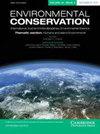乌拉圭两栖动物和爬行动物气候变化脆弱性专家评估
IF 2.6
3区 环境科学与生态学
Q2 BIODIVERSITY CONSERVATION
引用次数: 0
摘要
气候变化是对生物多样性的主要威胁,增加了物种灭绝的风险。评估其对物种可能产生的影响对于制定保护战略至关重要。在这里,我们将基于全球特征的方法调整到了国家层面,并将其应用于乌拉圭(南美洲),以评估其疱疹病毒的CC脆弱性。在2050年CC预测的情景中,共对112个物种进行了脆弱性三个方面的评估:敏感性、低适应能力和暴露。我们通过基于德尔菲方法的专家启发过程进行评估。我们发现,大多数本地物种(64.6%的两栖动物;100%的爬行动物)对CC高度敏感。其中,7种两栖动物(14.6%)和7种爬行动物(10.9%)被确定为高度易受CC影响。该物种的生活史特征存在重要差距,应指导未来的研究。结构化的专家咨询过程使我们能够收集更多更好的信息,而不是仅仅基于公布的来源。我们的研究确定了将比额表从全球改为国家的挑战,这些挑战可能用于其他国家的类似评估。本文章由计算机程序翻译,如有差异,请以英文原文为准。
Expert-based assessment of the climate change vulnerability of amphibians and reptiles of Uruguay
Climate change (CC) is a major threat to biodiversity, increasing species extinction risk. Assessments of its possible impacts on species are crucial for designing conservation strategies. Here, we adjusted a global trait-based approach to the national level and apply it to Uruguay (South America) to evaluate the CC vulnerability of its herpetofauna. A total of 112 species were assessed in a scenario of CC projections for 2050 with regard to three dimensions of vulnerability: sensitivity, low adaptive capacity and exposure. We conducted the assessment through an expert elicitation process based on the Delphi method. We found that most local species (64.6% amphibians; 100% reptiles) were highly sensitive to CC. Among them, seven amphibians (14.6%) and seven reptiles (10.9%) were identified as highly vulnerable to CC. Important gaps in the life-history traits of the species were found that should guide future research. The structured expert consultation process allowed us to gather more and better information than if it had only been based on published sources. Our study identified challenges associated with changing the scale from global to national that might be used for similar assessments in other countries.
求助全文
通过发布文献求助,成功后即可免费获取论文全文。
去求助
来源期刊

Environmental Conservation
环境科学-环境科学
CiteScore
5.20
自引率
3.70%
发文量
43
审稿时长
>36 weeks
期刊介绍:
Environmental Conservation is one of the longest-standing, most highly-cited of the interdisciplinary environmental science journals. It includes research papers, reports, comments, subject reviews, and book reviews addressing environmental policy, practice, and natural and social science of environmental concern at the global level, informed by rigorous local level case studies. The journal"s scope is very broad, including issues in human institutions, ecosystem change, resource utilisation, terrestrial biomes, aquatic systems, and coastal and land use management. Environmental Conservation is essential reading for all environmentalists, managers, consultants, agency workers and scientists wishing to keep abreast of current developments in environmental science.
 求助内容:
求助内容: 应助结果提醒方式:
应助结果提醒方式:


